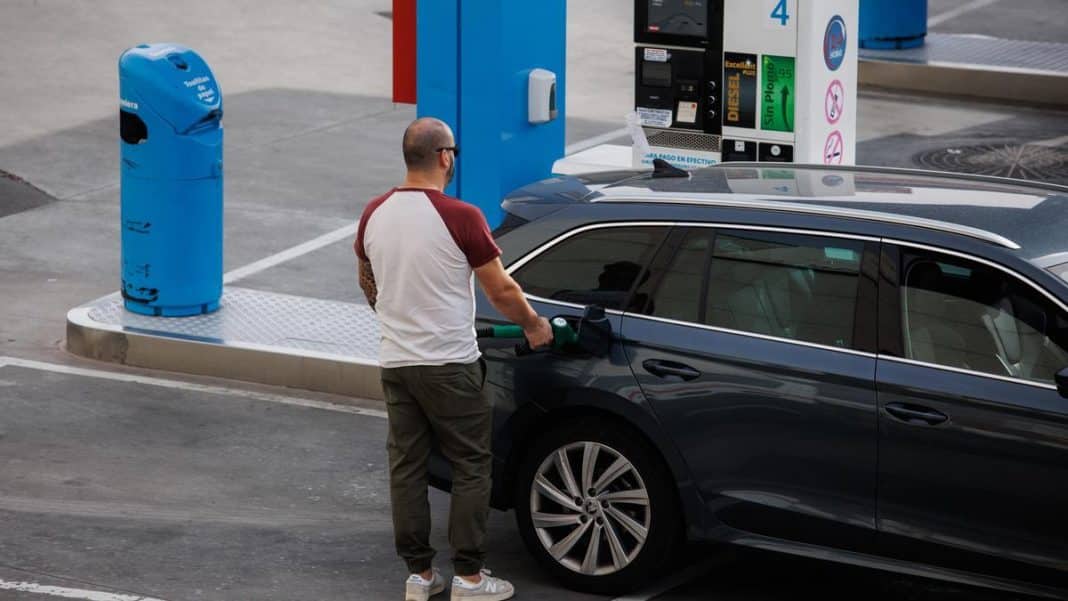One of the best-kept secrets of Pedro Sánchez’ Government is what will happen to the 20 cent fuel discount on January 1st, 2023, although many of his ministers have been dropping hints pointing to the end of its across-the-board nature. In the absence of an official announcement a week before the end of the year, the fuel stations are preparing for a “hoarding” effect typical of prior to a tax or price increase.
“If you were told that on December 31st you could fill up at one price and on January 1st at the same price plus 20 cents, would you not fill up before New Year’s Eve? It is obvious that there will be cases of shortages if this is not predicted with adequate time,” warns the Spanish Confederation of Service Station Entrepreneurs (CEEES), which mainly groups flag-ship fuel stations (those named after large groups but owned by small companies). The association claims that they have no information, be it official or not –having made a request to the Treasury that has not yet been answered- despite being “collaborators in the management of the fuel allowance, according to the royal decree law by which it is regulated”, and they add that the more the time that passes, the less capacity there is for action on the supply and staffing they need in the last week of the year.
The announcement is expected to be made on Tuesday 27th after the last Council of Ministers for the year, although the President of the Government Pedro Sánchez generated some confusion after mistakenly mentioning the 29th, instead of the 27th during an event last weekend. The most recent indication as to the end of the benefit for all drivers has been made this week by the Secretary of State for Economy, Gonzalo García de Andrés. Among the justifications for its withdrawal there are three that are constantly repeated: its “temporary” purpose to control inflation in the face of an emergency situation due to the war in Ukraine; its great cost, since it represents more than 6,000 million Euros of the public budget; and its regressive nature because it favors those with the highest purchasing power.
The Government has the current situation in its favor with the price of fuel already falling below what was paid before the war. With an average price of 1.567 euros per liter on Tuesday, December 20th, petrol is down from 1.589 euros a day before the invasion of Ukraine, according to the data from the geoportal on hydrocarbons of the Ministry for Ecological Transition. However, in the case of diesel the situation is very different, at almost 12% more expensive and likely to continue to increase due to Europe’s dependence on this fuel from Russia.
Fuel companies wait for Government announcement
The large companies such as Repsol, Cepsa and BP prefer to wait for the Government’s announcement before making any statement. But industry sources rule out that there will be problems in the finaly days of the year, beyond specific bottlenecks. They say that there are two scenarios being considered: either the discount will continue as it is at present, or it will be removed because otherwise there won’t be time to adapt the service stations’ software. This does not rule out that there could be discounts for vulnerable families or a bonus for truckers, as has been suggested by the Government, but both mechanisms would probably work without the intervention of the oil companies.
In the event of a general withdrawal of the subsidy, the industry is already working on various communication strategies to reassure its customers. The proposal is to return to the commercial policy of loyalty discounts with an eye on the investigation announced a week ago by the National Markets and Competition Commission (CNMC). The agency inspected the headquarters of the major oil companies after independent service stations complained about their aggressive discounts to end users and the high wholesale prices they charge for their fuels, which would prevent the smaller ones from competing on a level playing field.
Even if the discount disappears, in almost all of their interventions the various members of the Executive always save the truckers. Their employers’ association, the National Road Transport Committee (CNTC), confirm that they have not met with the government on the subject, but are confident that the discount will be maintained for them because it is part of the agreements reached between the Ministry of Transport and the sector. “In October we asked for it (to extend the discount in January) and the essense of the agreement is that while the crisis continues there is some way of relief,” says the CNTC. The formula could be similar to that of professional diesel fuel by way of a monthly rebate linked to a loyalty payment card but also extending it to the vehicles of less than 3,500 kilograms which currently do not have access to this rebate. On the possibility of a hoarding effect on the last day of the year they agree that “it will depend on what the government does. The later, the greater the risk.
For the full article, please visit Diario de Ibiza website here.

